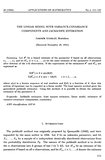Article
Full entry |
 PDF
(1.4 MB)
Feedback
PDF
(1.4 MB)
Feedback
 PDF
(1.4 MB)
Feedback
PDF
(1.4 MB)
Feedback
Keywords:
Jackknife estimator; least squares estimator; linear model; estimator of variance-covariance components; consistency
Jackknife estimator; least squares estimator; linear model; estimator of variance-covariance components; consistency
Summary:
Let $\theta^*$ be a biased estimate of the parameter $\vartheta$ based on all observations $x_1$, $\dots$, $x_n$ and let $\theta_{-i}^*$ ($i=1,2,\dots,n$) be the same estimate of the parameter $\vartheta$ obtained after deletion of the $i$-th observation. If the expectation of the estimators $\theta^*$ and $\theta_{-i}^*$ are expressed as $$ \align \mathrm{E}(\theta^*)&=\vartheta+a(n)b(\vartheta) \\ \mathrm{E}(\theta_{-i}^*)&=\vartheta+a(n-1)b(\vartheta)\qquad i=1,2,\dots,n, \endalign $$ where $a(n)$ is a known sequence of real numbers and $b(\vartheta)$ is a function of $\vartheta$, then this system of equations can be regarded as a linear model. The least squares method gives the generalized jackknife estimator. Using this method, it is possible to obtain the unbiased estimator of the parameter $\vartheta$.
References:
[1] W. Kruskal: When are Gauss-Markov and least square estimators identical? A coordinate free approach. Ann. Math. Statistics 39 (1968), 70–75. DOI 10.1214/aoms/1177698505 | MR 0222998
[2] G. H. Lavergne, J. R. Mathieu: The jackknife method and the Gauss-Markov estimation. Probability and Math. Statistics 8 (1987), 111–116. MR 0928124
[3] R. C. Miller, jr.: An unbalanced jackknife. Ann. Math. Statistics 2 (1974), 880–891. DOI 10.1214/aos/1176342811 | MR 0356353 | Zbl 0289.62042
[4] M. H. Quenouille: Approximate test of correlation in time-series. J. Roy. Statist. Soc. Ser. B 11 (1949), 68–84. MR 0032176
[5] M. H. Quenouille: Notes on bias in estimation. Biometrika 43 (1956), 353–360. DOI 10.1093/biomet/43.3-4.353 | MR 0081040 | Zbl 0074.14003
[6] C. R. Rao: Linear statistical inference and its applications. J. Wiley, 1973. MR 0346957 | Zbl 0256.62002
[7] F. Štulajter: Consistency of linear and quadratic least squares estimators in regression models with covariance stationary errors. Applications of Mathematics 36(2) (1991), 149–155. MR 1097699
[8] J. W. Tukey: Variances of variance components: II. The unbalanced single classification. Ann. Math. Statist. 28 (1957), 43–56. DOI 10.1214/aoms/1177707036 | MR 0084974

